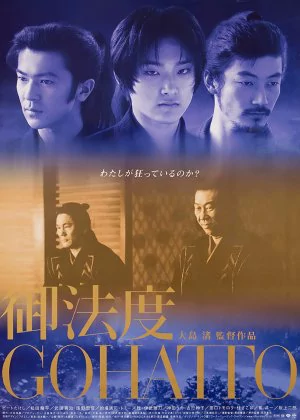Taboo
What happened to Nagisa Oshima's Taboo (Gohatto)? Once a film that kicked up quite a lot of dust, with themes that are more relevant (and popular) than ever. Oshima is still a big and respected name too, the cast has some established names (not to mention that it properly launched some careers) and the quality is consistent from start to finish. And yet, it's a film that seems to have slipped from the radar almost completely. Undeservedly so, as my latest rewatch confirmed. Taboo is like no other samurai film out there, that alone makes it worth a watch.
![screen capture of Taboo [Gohatto]](/thumbs/img/articles/1200xauto/taboo-1.webp)
Even people unfamiliar with Japanese cinema (or culture in general) know what a samurai is, and what they broadly represent. They were fierce, fearsome, and skilled swordfighters with a strong sense of honor and a rigorous code of conduct. Yamada's Twilight Samurai pierced that image, but not as strongly as Oshima's Taboo, which puts the focus on the forbidden (but quietly accepted) relationships between some of the men. Apparently, gay romance was relatively prevalent among samurai, not a topic you see often discussed in other films.
Oshima's name clearly helped to attach a proper cast and crew to a film like this. Nagisa Oshima may not be a household name like Kurosawa or Ozu, but once you start digging into the Japanese classics there really is no escaping the man's legacy. By the time he made Taboo (his final film), he had enough pull to set up the kind of project other directors could only dream of. It's not a sure-fire guarantee for success, but it certainly helps to have capable people on board in each and every position, who have the necessary craft and skill to execute a director's vision. And ultimately, that's what makes this film stand out.
The plot revolves around Sozaburo Kano, a young samurai recruit who joins the Shinsengumi, a clan that strives to uphold traditional samurai conduct and values. Tashiro is the second recruit allowed in, a much more outgoing and crude character. Kano's superiors appreciate his soft demeanor combined with his excellent sword fighting skills, but it quickly transpires that's not all they admire. Kano isn't the manliest of men, and with not many women around to take care of the samurai's romantic needs, he quickly becomes their main point of affection. Unwilling to go against his superiors, Kano can't but submit to their requests.
![screen capture of Taboo [Gohatto]](/thumbs/img/articles/1200xauto/taboo-2.webp)
Gohatto has a pretty traditional look, meaning, you get a lot of dim browns and greys in the color palette, which are further muted by darker lighting and a broader absence of bright elements. It is not my favorite look, but it does fit the genre very well and it is further elevated by the camera work, which is very deliberate and eye-catching by itself. Most of all though, Taboo looks extremely polished and accomplished, without ever becoming too dull or expected. Add a handful of standout shots and scenes and you get a very attractive-looking film.
The score is at the same level, but a bit more interesting. Oshima worked together with Ryuichi Sakamoto, one of the most notable Japanese composers, and his score really makes a difference here. It pulls away from more traditional Japanese music, replacing it with Sakamoto's personal signature sound. It's not that I am the man's biggest fan, but I instantly recognized his hand, and that doesn't happen all too often. The score has character, it directs the mood and it lingers without drawing too much attention to itself. I couldn't have asked for more.
The cast is probably one of the film's biggest perks, though at the time some of its biggest stars were just budding talents themselves. You get Takeshi Kitano, who has one of the most recognizable faces in Japanese cinema and who kind of leads the cast (and story), but it's the combo of Tadanobu Asano and Ryuhei Matsuda that truly sparkles. And I don't exaggerate when I say that Matsuda is easily the better of the two here, as I must admit I didn't even remember Asano was actually in the film. Taboo properly launched Matsuda, and even though he made quite a career for himself, it's still one of his most memorable roles to date.
![screen capture of Taboo [Gohatto]](/thumbs/img/articles/1200xauto/taboo-3.webp)
Even though Taboo is relatively open and straightforward about its themes, the actual imagery remains pretty demure and suggestive, so don't expect anything taboo by modern standards. It also isn't a pure drama, Oshima peppers the story with a little action and added intrigues, which are things that may disappoint people who'd preferred this to be a purely LGBTQ+-focused samurai flick. I'm happy with Oshima's choices though, as it makes the film a little less predictable and it kept me at least somewhat interested in the narrative aspects of the film.
Taboo will forever be "that gay samurai flick" (unless it becomes a popular niche in the years or decades to come, I wouldn't hold my breath though), but it has considerably more to bring to the table than its plain descriptor suggests. Oshima delivers a very polished and accomplished film, offering splendid cinematography, a lovely score, stellar performances of its main cast, and an intriguing plot. There's no reason to avoid this film unless the mere idea of gay samurai makes you cringe. In that case, I guess you have more important things to address first. Nagisa Oshima's swan song is a film worth watching, so please do so when you get the chance.
